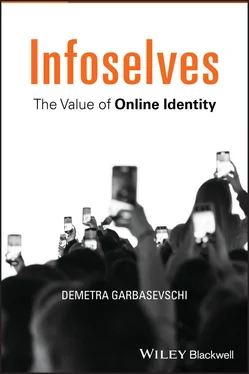The second chapter, “The Datafied Identity and Latent Self-Commodification,” discusses self-commodification from the perspective of dominance. The historical context that fuels our identities today is one of deep digital immersion, where the “line” in on line , and off line has become increasingly invisible and so, irrelevant. Consequently, the construction and performance of the self through social interaction happens neither entirely on , nor entirely off , but rather through the notorious line. Selves are inevitably formed as informational entities that populate a highly digitized infosphere. The massive quantity of data that individuals knowingly or unknowingly offer about themselves online represents the fundamental resource that fuels a prosperous economic system – the identity economy. The datafication of selves by commercial entities interested in extracting behavioral data to form sellable identity categories, or even define categories of one, for persuasion purposes is the foundational principle of what I have termed latent self-commodification . Its unfavorable reputation comes from the revelation that it exploits not only the visible but also the hidden layers of identity information that are produced by being online. The identity economy has been built backstage and remains ambiguous in the absence of effective regulation or enforcement, raising a constellation of questions about ethics, privacy, or personal data ownership.
The third chapter, “The Rise of Assertive Self-Commodification,” offers the counter-narrative to the story of identity commodification as dominance. The social turn of the Internet, with its unrestricted access to easy-to-use self-presentation tools, has made it easier for identities to become image-oriented and strategically managed, revealing the potential of the self to be a profitable project, this time for the benefit of the individual themselves. And, within a cultural narrative that valorizes the Internet as the new ground for achieving personal visibility and that sees self-promotion as the ultimate solution to a changing work landscape, the personal branding paradigm has become part of the online ethos. Backed by the glorification of self-entrepreneurship, self-branding has evolved from being an inaccessible practice, largely reserved for offline-established personal brands, to be a practical option for regular individuals wishing to enhance their marketability. The assertive commodification that self-branding entails offers the individual the option to hack self-commodification. The identity economy, with its behind-the-scenes datafication of identities, is not the only manifestation of the identity trade. A flourishing influencer economy is equally invested in the (this time consensual) commodification of identities.
The fourth and last chapter, “Researching Online Identity,” uses my own research findings to start a conversation about how online identities are constructed and performed in practice, taking into account the build-up of the previous chapters. This last section of the book draws further attention to the unique context of younger generations, for whom technology has always been an ordinary element of everyday surroundings, and the line always invisible. By exposing what young people understand of and how they relate to their online identities, we can evaluate our options of addressing their present and future vulnerabilities as infoselves. It has come to a point where our connection to new generations depends on our willingness to understand their behavior through-the-line.
1 1 The 5 Rights Foundation caters to the rights of children in the digital environment.
1 Altheide D.L. (1995). An Ecology of Communication. Cultural Formats of Control. Berlin: Walter De Gruyter.
2 Clegg N. (2019). Breaking up Facebook Is Not the Answer. The New York Times (11 May), online. https://www.nytimes.com/2019/05/11/opinion/facebook-nick-clegg-chris-hughes.html(accessed 12 May 2019).
3 Dance G.J.X., LaForgia M., and Confessore N. (2018). As Facebook Raised a Privacy Wall, It Carved an Opening for Tech Giants. The New York Times (18 December), online. https://www.nytimes.com/2018/12/18/technology/facebook-privacy.html(accessed 2 May 2019).
4 European Commission. (n.d.). https://ec.europa.eu/info/law/law-topic/data-protection/reform/what-personal-data_en(accessed 2 May 2019).
5 European Court of Justice. (2014). Judgment of the Court. https://eur-lex.europa.eu/legal-content/EN/TXT/?qid=1558430651482&uri=CELEX:62012CJ0131(accessed 4 December 2014).
6 European Parliament. (2016). General Data Protection Regulation. https://eur-lex.europa.eu/eli/reg/2016/679/oj(accessed 3 October 2016).
7 Federal Trade Commission. (2019). FTC Imposes $5 Billion Penalty and Sweeping New Privacy Restrictions on Facebook. https://www.ftc.gov/news-events/press-releases/2019/07/ftc-imposes-5-billion-penalty-sweeping-new-privacy-restrictions(accessed 17 June 2020).
8 Floridi L. (2011). The Informational Nature of Personal Identity. Minds and Machines 21(4): 549–566.
9 Floridi L. (2014a). The 4th Revolution. How the Infosphere Is Reshaping Human Reality. Oxford: Oxford University Press.
10 Floridi, L. (ed.). (2014b). The Onlife Manifesto. New York: Springer.
11 Google. (2019). Transparency Report. https://transparencyreport.google.com/eu-privacy/overview(accessed 2 May 2019).
12 Hughes C. (2019). It’s Time to Break up Facebook. The New York Times (9 May), online. https://www.nytimes.com/2019/05/09/opinion/sunday/chris-hughes-facebook-zuckerberg.html(accessed 12 May 2019).
13 Kindron B. and Rudkin A. (2017). https://5rightsfoundation.com/static/Digital_Childhood_report_-_EMBARGOED.pdf
14 Lapowsky I. (2018). The 21 (and Counting) Biggest Facebook Scandals of 2018. Wired (20 December), online. https://www.wired.com/story/facebook-scandals-2018(accessed 2 May 2019).
15 Technology Review. (2016). Data Mining Reveals the Six Basic Emotional Arcs of Storytelling. Technology Review (6 July), online. https://www.technologyreview.com/2016/07/06/158961/data-mining-reveals-the-six-basic-emotional-arcs-of-storytelling(accessed 10 January 2019).
16 Yakob F. (2015). Paid Attention. Innovative Advertising for a Digital World. London: Kogan Page.
Конец ознакомительного фрагмента.
Текст предоставлен ООО «ЛитРес».
Прочитайте эту книгу целиком, купив полную легальную версию на ЛитРес.
Безопасно оплатить книгу можно банковской картой Visa, MasterCard, Maestro, со счета мобильного телефона, с платежного терминала, в салоне МТС или Связной, через PayPal, WebMoney, Яндекс.Деньги, QIWI Кошелек, бонусными картами или другим удобным Вам способом.











